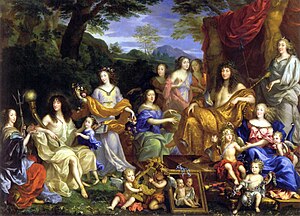Royal family: Difference between revisions
rvv |
No edit summary |
||
| Line 13: | Line 13: | ||
In a constitutional monarchy, when the monarch dies, there is always a very specific [[order of succession]] that indicates the exact order of family members in line to the throne. |
In a constitutional monarchy, when the monarch dies, there is always a very specific [[order of succession]] that indicates the exact order of family members in line to the throne. |
||
In some cases, well-known families that are not actually involved in monarchies but are still prominent in government are informally referred to as "royal families". The best-known example of this is the [[Kennedy political family|Kennedy family]] in the U.S. and the descendents of the Gurjara-Pratiharas clans or "Rajputs" in India. See [[Gujjar]]. |
In some cases, well-known families that are not actually involved in monarchies but are still prominent in government are informally referred to as "royal families". The best-known example of this is the [[Kennedy political family|Kennedy family]] and the [[Bush]] family in the U.S. and the descendents of the Gurjara-Pratiharas clans or "Rajputs" in India. See [[Gujjar]]. |
||
Some royal families have lost their "royalty" by social changes over a long period time. This fate befell the [[Nair]] families of Kerala, India, after the advent of Namboodiri Brahmins in the 12th century who claimed caste superiority over the Nair kings. |
Some royal families have lost their "royalty" by social changes over a long period time. This fate befell the [[Nair]] families of Kerala, India, after the advent of Namboodiri Brahmins in the 12th century who claimed caste superiority over the Nair kings. |
||
Revision as of 08:15, 24 July 2007
- This article is about the monarchy-related concept. For other uses, see Royal Family (disambiguation).
A royal family is the extended family of a monarch. Generally, the head of a royal family is a king or queen regnant. The term "imperial family" more appropriately describes the extended family of an emperor or empress regnant, while the terms "ducal family", "grand ducal family" or "princely family" are more appropriate in reference to the relatives of a reigning duke, grand duke, or prince. Finally, it is considered proper in some circles to refer to the extended relations of a deposed monarch and his or her descendants as a royal family.
A royal family typically includes the spouse of the reigning monarch, surviving spouses of a deceased monarch, the children, grandchildren, brothers, sisters, and cousins of the reigning monarch, as well as their spouses. In some cases, royal family membership may extend to great granchildren and more distant descendants of a monarch. In certain monarchies where voluntary abdication is the norm, such as the Netherlands, a royal family may also include one or more former monarchs. There is often a distinction between persons of the blood royal and those that marry into the royal family. In certain instances, such as in Canada, the royal family is defined by who holds the titles Majesty and Royal Highness.[1] Under most systems, only persons in the first category are dynasts, that is, potential successors to the throne (unless the member of the latter category is also in line to the throne in their own right, a frequent occurrence in royal families which frequently intermarry). This is not always observed; some monarchies have operated by the principle of jure uxoris.

In general, certain relatives of the monarch (by blood or marriage) possess special privileges and are subject to certain statutes, conventions, or special common law. The precise functions of a royal family vary depending on whether the polity in question is an absolute monarchy, a constitutional monarchy, or somewhere in between. In certain absolute monarchies, such as that found in Saudi Arabia or Kuwait, or in political systems where the monarch actually exercises executive power, such as in Jordan, it is not uncommon for the members of a royal family to hold important government posts or military commands. In most constitutional monarchies, however, members of a royal family perform certain public, social, or ceremonial functions, but refrain from any involvement in electoral politics or the actual governance of the country.
The specific composition of royal families varies from country to country, as do the titles and royal and noble styles held by members of the family. The composition of the royal family may be regulated by statute enacted by the legislature (e.g. Spain, the Netherlands, and Japan since 1947), the Sovereign's prerogative and common law tradition (e.g. the United Kingdom), or a private house law (e.g., Liechtenstein, the former royal houses of Bavaria, Prussia, Hanover, etc.). Public statutes, constitutional provisions, or conventions may also regulate the marriages, names, and personal titles of royal family members. The members of a royal family may or may not have a surname or dynastic name (see Royal House).
In a constitutional monarchy, when the monarch dies, there is always a very specific order of succession that indicates the exact order of family members in line to the throne.
In some cases, well-known families that are not actually involved in monarchies but are still prominent in government are informally referred to as "royal families". The best-known example of this is the Kennedy family and the Bush family in the U.S. and the descendents of the Gurjara-Pratiharas clans or "Rajputs" in India. See Gujjar.
Some royal families have lost their "royalty" by social changes over a long period time. This fate befell the Nair families of Kerala, India, after the advent of Namboodiri Brahmins in the 12th century who claimed caste superiority over the Nair kings.
In recent years, many royal families have become increasingly challenged by the media to justify the public expenditure on them. This is particularly so when the royal family is perceived as behaving badly (extra-marital affairs, or refusing to grieve on the death of Lady Diana).
Famous royal houses and dynasties
Royal families
See also
|
